Interventions for improving medical students' interpersonal communication in medical consultations
- PMID: 33559127
- PMCID: PMC8094582
- DOI: 10.1002/14651858.CD012418.pub2
Interventions for improving medical students' interpersonal communication in medical consultations
Abstract
Background: Communication is a common element in all medical consultations, affecting a range of outcomes for doctors and patients. The increasing demand for medical students to be trained to communicate effectively has seen the emergence of interpersonal communication skills as core graduate competencies in medical training around the world. Medical schools have adopted a range of approaches to develop and evaluate these competencies.
Objectives: To assess the effects of interventions for medical students that aim to improve interpersonal communication in medical consultations.
Search methods: We searched five electronic databases: Cochrane Central Register of Controlled Trials, MEDLINE, Embase, PsycINFO, and ERIC (Educational Resource Information Centre) in September 2020, with no language, date, or publication status restrictions. We also screened reference lists of relevant articles and contacted authors of included studies.
Selection criteria: We included randomised controlled trials (RCTs), cluster-RCTs (C-RCTs), and non-randomised controlled trials (quasi-RCTs) evaluating the effectiveness of interventions delivered to students in undergraduate or graduate-entry medical programmes. We included studies of interventions aiming to improve medical students' interpersonal communication during medical consultations. Included interventions targeted communication skills associated with empathy, relationship building, gathering information, and explanation and planning, as well as specific communication tasks such as listening, appropriate structure, and question style.
Data collection and analysis: We used standard methodological procedures expected by Cochrane. Two review authors independently reviewed all search results, extracted data, assessed the risk of bias of included studies, and rated the quality of evidence using GRADE.
Main results: We found 91 publications relating to 76 separate studies (involving 10,124 students): 55 RCTs, 9 quasi-RCTs, 7 C-RCTs, and 5 quasi-C-RCTs. We performed meta-analysis according to comparison and outcome. Among both effectiveness and comparative effectiveness analyses, we separated outcomes reporting on overall communication skills, empathy, rapport or relationship building, patient perceptions/satisfaction, information gathering, and explanation and planning. Overall communication skills and empathy were further divided as examiner- or simulated patient-assessed. The overall quality of evidence ranged from moderate to very low, and there was high, unexplained heterogeneity. Overall, interventions had positive effects on most outcomes, but generally small effect sizes and evidence quality limit the conclusions that can be drawn. Communication skills interventions in comparison to usual curricula or control may improve both overall communication skills (standardised mean difference (SMD) 0.92, 95% confidence interval (CI) 0.53 to 1.31; 18 studies, 1356 participants; I² = 90%; low-quality evidence) and empathy (SMD 0.64, 95% CI 0.23 to 1.05; 6 studies, 831 participants; I² = 86%; low-quality evidence) when assessed by experts, but not by simulated patients. Students' skills in information gathering probably also improve with educational intervention (SMD 1.07, 95% CI 0.61 to 1.54; 5 studies, 405 participants; I² = 78%; moderate-quality evidence), but there may be little to no effect on students' rapport (SMD 0.18, 95% CI -0.15 to 0.51; 9 studies, 834 participants; I² = 81%; low-quality evidence), and effects on information giving skills are uncertain (very low-quality evidence). We are uncertain whether experiential interventions improve overall communication skills in comparison to didactic approaches (SMD 0.08, 95% CI -0.02 to 0.19; 4 studies, 1578 participants; I² = 4%; very low-quality evidence). Electronic learning approaches may have little to no effect on students' empathy scores (SMD -0.13, 95% CI -0.68 to 0.43; 3 studies, 421 participants; I² = 82%; low-quality evidence) or on rapport (SMD 0.02, 95% CI -0.33 to 0.38; 3 studies, 176 participants; I² = 19%; moderate-quality evidence) compared to face-to-face approaches. There may be small negative effects of electronic interventions on information giving skills (low-quality evidence), and effects on information gathering skills are uncertain (very low-quality evidence). Personalised/specific feedback probably improves overall communication skills to a small degree in comparison to generic or no feedback (SMD 0.58, 95% CI 0.29 to 0.87; 6 studies, 502 participants; I² = 56%; moderate-quality evidence). There may be small positive effects of personalised feedback on empathy and information gathering skills (low quality), but effects on rapport are uncertain (very low quality), and we found no evidence on information giving skills. We are uncertain whether role-play with simulated patients outperforms peer role-play in improving students' overall communication skills (SMD 0.17, 95% CI -0.33 to 0.67; 4 studies, 637 participants; I² = 87%; very low-quality evidence). There may be little to no difference between effects of simulated patient and peer role-play on students' empathy (low-quality evidence) with no evidence on other outcomes for this comparison. Descriptive syntheses of results that could not be included in meta-analyses across outcomes and comparisons were mixed, as were effects of different interventions and comparisons on specific communication skills assessed by the included trials. Quality of evidence was downgraded due to methodological limitations across several risk of bias domains, high unexplained heterogeneity, and imprecision of results. In general, results remain consistent in sensitivity analysis based on risk of bias and adjustment for clustering. No adverse effects were reported. AUTHORS' CONCLUSIONS: This review represents a substantial body of evidence from which to draw, but further research is needed to strengthen the quality of the evidence base, to consider the long-term effects of interventions on students' behaviour as they progress through training and into practice, and to assess effects of interventions on patient outcomes. Efforts to standardise assessment and evaluation of interpersonal skills will strengthen future research efforts.
Copyright © 2021 The Cochrane Collaboration. Published by John Wiley & Sons, Ltd.
Conflict of interest statement
Conor Gilligan: none known
Martine Powell: none known
Marita C Lynagh: none known
Bernadette M Ward: none known
Chris Lonsdale has received consultancy fees from commercial agencies on health promotion products. His research is supported by grants from government and philanthropic agencies
Pam Harvey: none known
Erica L James: none known
Sari Dewi: none known
Smriti Nepal: none known
Dominique Rich: none known
Hayley Croft: none known
Jonathan Silverman has worked at the forefront of the development of communication skills, teaching in undergraduate medical education for the last 20 years, and recently retired from the School of Clinical Medicine, University of Cambridge, where he led the undergraduate communication programme. He receives royalties from two books that he wrote about healthcare communication, and he travels as president of the European Association for Communication in Healthcare.
Figures
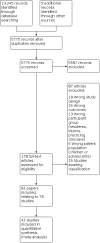

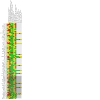

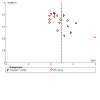
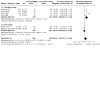
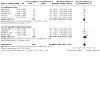
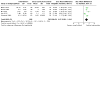
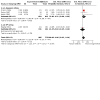

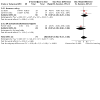
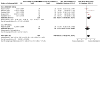
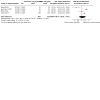
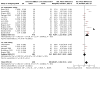
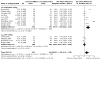
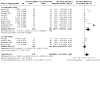
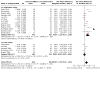

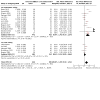

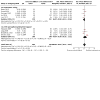
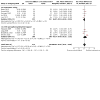

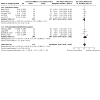

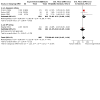
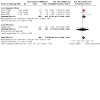
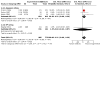
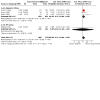
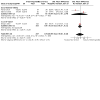
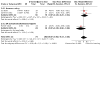
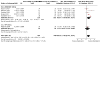


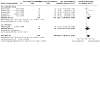
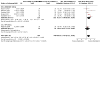
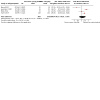
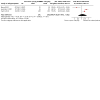
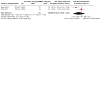

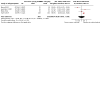
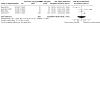
Update of
- doi: 10.1002/14651858.CD012418
References
References to studies included in this review
Allen 1990 {published data only}
-
- Allen SS, Bland CJ, Dawson SJ. A mini-workshop to train medical students to use a patient-centered approach to smoking cessation. American Journal of Preventive Medicine 1990;6(1):28-33. - PubMed
Alroy 1984 {published data only}
-
- Alroy G, Ber R, Kramer D. An evaluation of the short-term effects of an interpersonal skills course. Medical Education 1984;18(2):85-9. - PubMed
Bearman 2001 {published data only}
-
- Bearman M, Cesnik B, Liddell M. Random comparison of 'virtual patient' models in the context of teaching clinical communication skills. Medical Education 2001;35(9):824-32. - PubMed
Berney 2017 {published data only}
-
- Berney A, Carrard V, Schmid Mast M, Bonvin R, Stiefel F, Bourquin C. Individual training at the undergraduate level to promote competence in breaking bad news in oncology. Psycho-oncology 2017;26(12):2232-7. - PubMed
Betchart 1984 {published data only}
-
- Betchart NS, Anderson DG, Thompson TL, Mumford E. A tutorial approach to improving medical students' interviewing skills. Journal of Medical Education 1984;59(5):431-3. - PubMed
Blatt 2010 {published data only}
-
- Blatt B, LeLacheur SF, Galinsky AD, Simmens JS, Greenberg L. Does perspective-taking increase patient satisfaction in medical encounters? Academic Medicine 2010;89(5):1445-52. - PubMed
Bosse 2012 {published data only}
-
- Bosse HM, Schultz JH, Nickel M, Lutz T, Moltner A, Junger J, et al. The effect of using standardized patients or peer role play on ratings of undergraduate communication training: a randomized controlled trial. Patient Education and Counseling 2012;87(3):300-6. - PubMed
Bowyer 2006 {published data only}
-
- Bowyer MW, Rawn L, Hanson J, Pimentel, EA, Flanagan A, Ritter EM, et al. Combining high-fidelity human patient simulators with a standardized family member: a novel approach to teaching breaking bad news. In: Westwood, JD, et al, editors(s). Studies in Health Technology and Informatics; Medicine Meets Virtual Reality 14 - Accelerating Change in Healthcare. Long Beach, CA: IOS Press, 2006:67-72. - PubMed
Bowyer 2010 {published data only}
-
- Bowyer MW, Hanson JL, Pimentel EA, Flanagan AK, Rawn LM, Rizzo AG, et al. Teaching breaking bad news using mixed reality simulation. Journal of Surgical Research 2010;159(1):462-7. - PubMed
Buffel du Vaure 2017 {published data only}
-
- Buffel du Vaure C, Lemogne C, Bunge L, Catu-Pinault A, Hoertel N, Ghasarossian C, et al. Promoting empathy among medical students: a two-site randomized controlled study. Journal of Psychosomatic Research 2017;103:102-7. - PubMed
Cave 2007 {published data only}
-
- Cave J, Washer P, Sampson P, Griffin M, Noble L. Explicitly linking teaching and assessment of communication skills. Medical Teacher 2007;29(4):317-22. - PubMed
Chibhall 2005 {published data only}
-
- Chibnall JT, Cook MA, Miller DK. Religious awareness training for medical students: effect on clinical interpersonal behavior. Southern Medical Journal 2005;98(12):1255. - PubMed
Colletti 2001 {published data only}
-
- Colletti L, Gruppen L, Barclay M, Stern D. Teaching students to break bad news. American Journal of Surgery 2001;182(1):20-3. - PubMed
Daeppen 2012 {published data only}
-
- Daeppen JB, Fortini C, Bertholet N, Bonvin R, Berney A, Michaud PA, et al. Training medical students to conduct motivational interviewing: a randomized controlled trial. Journal of General Internal Medicine 2011;26:S49. - PubMed
-
- Daeppen J-B, Fortini C, Bertholet N, Bonvin R, Berney A, Michaud P-A, et al. Training medical students to conduct motivational interviewing: a randomized controlled trial. Patient Education and Counseling 2012;87(3):313-8. - PubMed
Edwardsen 2006 {published data only}
-
- Evans BJ, Stanley RO, Burrows Graham D. Measuring medical students' empathy skills. British Journal of Medical Psychology 1993;66(2):121-33. - PubMed
Eells 2002 {published data only}
-
- Eells T, Strauss Gordon D, Teller D, Feldman T. Problem-oriented instruction as a predictor of success in early psychiatric interviewing. Academic Psychiatry 2002;26(2):82-9. - PubMed
Engerer 2019 {published and unpublished data}
Evans 1989 {published data only}
-
- Evans BJ, Stanley RO, Burrows GD, Sweet B. Lectures and skills workshops as teaching formats in a history-taking skills course for medical students. Medical Education 1989;23(4):364-70. - PubMed
-
- Evans BJ, Stanley RO, Burrows GD. Measuring medical students' empathy skills. British Journal of Medical Psychology 1993;66(2):121-33. - PubMed
-
- Evans BJ, Stanley RO, Mestrovic R, Rose L. Effects of communication skills training on students' diagnostic efficiency. Medical Education 1991;25(6):517-26. - PubMed
Evans 1996 {published data only}
-
- Evans BJ, Coman GJ, Goss B. Consulting skills training and medical students' interviewing efficiency. Medical Education 1996;30(2):121-8. - PubMed
-
- Evans BJ, Stanley RO, Coman G, Sinnott V. Measuring medical students' communication skills: development and evaluation of an interview rating scale. Psychology and Health 1992;6(3):213-25.
-
- Evans BJ, Sweet B. Consulting-skills training to improve medical students' diagnostic efficiency. Academic Medicine 1993;68(2):170-1. - PubMed
Feddock 2009 {published data only}
-
- Feddock C, Hoellein A, Griffith C, Wilson J, Lineberry M, Haist S. Enhancing knowledge and clinical skills through an adolescent medicine workshop. Archives of Paediatric and Adolescent Medicine 2009;163(3):256-60. - PubMed
Filipetto 2006 {published data only}
-
- Filipetto FA, Weiss LB, Switala CA, Bertagnolli JF. The effectiveness of a first-year clinical preceptorship on the data collection and communication skills of second-year medical students. Teaching and Learning in Medicine 2006;18(2):137-41. - PubMed
Foster 2016 {published data only}
-
- Foster A, Chaudhary N, Kim T, Waller Jennifer L, Wong J, Borish M, et al. Using virtual patients to teach empathy: a randomized controlled study to enhance medical students' empathic communication. Simulation in Healthcare 2016;11(3):181-9. - PubMed
Gartmeir 2015 {published and unpublished data}
-
- Gartmeier M, Bauer J, Fischer Martin R, Hoppe-Seyler T, Karsten G, Kiessling C, et al. Fostering professional communication skills of future physicians and teachers: effects of e-learning with video cases and role-play. Instructional Science 2015;43(4):443-62.
Gerber 1985 {published data only}
-
- Gerber W, Matthes S, Albanese M. A comparison of instructional techniques: internal -external vs. external only. In: Eighteenth Annual Conference on Research in Medical Education. 1979:59-64. - PubMed
-
- Gerber WL, Albanese M, Brown D, Matthes S. Teaching with simulated patients. Evaluation of the long-term effectiveness of instruction. Evaluation and the Health Professions 1985;8(1):69-92.
Ho 2008 {published data only}
Hobgood 2009 {published data only}
-
- Hobgood CD, Tamayo-Sarver JH, Hollar DW Jr, Sawning S. GrievIng: death notification skills and applications for fourth-year medical student. Teaching and Learning in Medicine 2009;21(3):207-19. - PubMed
Ishikawa 2010 {published and unpublished data}
-
- Ishikawa H, Hashimoto H, Kinoshita M, Yano E. Can nonverbal communication skills be taught? Medical Teacher 2010;32(10):860-3. - PubMed
Kahan 2003 {published data only}
-
- Kahan M, Wilson L, Midmer D, Borsoi D, Martin D. Randomized controlled trial on the effects of a skills-based workshop on medical students' management of problem drinking and alcohol dependence. Substance Abuse 2003;24(1):15-6. - PubMed
Kaltman 2018 {published data only}
-
- Kaltman S, Talisman N, Pennestri N, Syverson E, Arthur P, Vovides Y. Using technology to enhance teaching of patient-centered Interviewing for early medical students. Simulation in Healthcare 2018;13(3):188-94. - PubMed
Klein 2000 {published data only}
-
- Klein S, Tracy D, Kitchener H, Walker L. The effects of the participation of patients with cancer in teaching communication skills to medical undergraduates: a randomised study with follow-up after 2 years. European Journal of Cancer 2000;36(2):273-81. - PubMed
-
- Klein S. Does cancer patient participation in communication in skills training enhance the performance of medical undergraduates? Psycho-oncology 1995;4(2):90.
Knowles 2001 {published data only}
Lee 2015 {published data only}
-
- Lee AL, Mader EM, Morley CP. Teaching cross-cultural communication skills online: a multi-method evaluation. Family Medicine 2015;47(4):302-8. - PubMed
Legg 2005 {published data only}
-
- Legg C, Young L, Bryer A. Training sixth-year medical students in obtaining case history information from adults with aphasia. Aphasiology 2005;19(6):559-75.
Levenkron 1990 {published data only}
-
- Levenkron JC, Greenland P, Bowley N. Teaching risk-factor counseling skills: a comparison of two instructional methods. American Journal of Preventive Medicine 1990;6(2 Suppl):29-34. - PubMed
Lim 2011 {published data only}
-
- Lim Bee T, Moriarty H, Huthwaite M. "Being-in-role": a teaching innovation to enhance empathic communication skills in medical students. Medical Teacher 2011;33(12):e663-9. - PubMed
Liu 2016 {published data only}
-
- Liu C, Lim Renee L, McCabe Kathryn L, Taylor S, Calvo Rafael A. A web-based telehealth training platform incorporating automated nonverbal behavior feedback for teaching communication skills to medical students: a randomized crossover study. Journal of Medical Internet Research 2016;18(9):e246. - PMC - PubMed
Lorin 2006 {published data only}
-
- Lorin S, Rho L, Wisnivesky JP, Nierman DM. Improving medical student intensive care unit communication skills: a novel educational initiative using standardized family members. Critical Care Medicine 2006;34(9):2386-91. - PubMed
LoSasso 2017 {published data only}
-
- LoSasso AA, Lamberton CE, Sammon M, Berg KT, Caruso JW, Cass J, et al. Enhancing student empathetic engagement, history-taking, and communication skills during electronic medical record use in patient care. Academic Medicine 2017;92(7):1022-7. - PubMed
Lupi 2012 {published and unpublished data}
-
- Lupi C, Estes C, Broome M, Schreiber M. Conscientious refusal in reproductive medicine: an educational intervention. American Journal of Obstetrics and Gynaecology 2009;201(502):e1-7. - PubMed
-
- Lupi Carla S, Runyan A, Schreiber N, Steinauer J, Turk Jema K. An educational workshop and student competency in pregnancy options counseling: a randomized controlled trial. American Journal of Obstetrics and Gynecology 2012;207(5):414.e1-7. - PubMed
Maguire 1977 {published data only}
-
- Maguire GP, Clarke D, Jolley B. An experimental comparison of three courses in history-taking skills for medical students. Medical Education 1977;11(3):175-82. - PubMed
Maguire 1978 {published data only}
-
- Maguire P, Roe P, Goldberg D, Jones S, Hyde C, O'Dowd T. The value of feedback in teaching interviewing skills to medical students. Psychological Medicine 1978;8(4):695-704. - PubMed
Mason 1988 {published data only}
-
- Mason JL, Barkley SE, Kappelman MM, Carter DE, Beachy WV. Evaluation of a self-instructional method for improving doctor-patient communication. Journal of Medical Education 1988;63(8):629-35. - PubMed
Meirovich 2016 {published data only}
Moreland 1973 {published data only}
-
- Moreland JR, Ivey AE, Phillips JS. An evaluation of microcounseling as an interviewer training tool. Journal of Consulting and Clinical Psychology 1973;41(2):294-300. - PubMed
-
- Moreland JR. Video Programmed Instruction in Elementary Psychotherapeutic and Related Clinical Skills. Final Report (dissertation submitted as partial fulfullment of the requirements for Doctor of Philosphy; Clinical Psychology). Denver University Colorado, Department. of Psychology; Massachusetts University Amherst. School of Education; Oklahoma University, Oklahoma City Medical Center 1971.
Morrow 2009 {published data only}
-
- Morrow JB, Dobbie AE, Jenkins C, Long R, Mihalic A, Wagner J. First-year medical students can demonstrate EHR-specific communication skills: a control-group study. Family Medicine 2009;41(1):28-33. - PubMed
Mounsey 2006 {published data only}
-
- Mounsey AL, Bovbjerg V, White L, Gazewood J. Do students develop better motivational interviewing skills through role-play with standardised patients or with student colleagues? Medical Education 2006;40(8):775-80. - PubMed
Nomura 2017 {published data only}
Ockene 2016 {published data only}
Ozcakar 2009 {published data only}
Palmer 2018 {published data only}
-
- Palmer BA, Lee JH, Somers KJ, Swintak CC, Rullo J, Bright RP, et al. Effect of in-class vs online education on sexual health communication skills in first-year medical students: a pilot study. Academic Psychiatry 2018;43:175-9. - PubMed
Papadakis 1997 {published data only}
-
- Papadakis MA, Croughan-Minihane M, Fromm LJ, Wilkie HA, Ernster VL. A comparison of two methods to teach smoking-cessation techniques to medical students. Academic Medicine 1997;72(8):725-7. - PubMed
Perera 2010 {published data only}
-
- Perera J, Mohamadou G, Kaur S. The use of objective structured self-assessment and peer-feedback (OSSP) for learning communication skills: evaluation using a controlled trial. Advances in Health Sciences Education 2010;15(2):185-93. - PubMed
Pirdehghan 2018 {published data only}
-
- Pirdehghan A, Vakili M, Mirzaei M, Karimi M. The effect of training in communication skills on medical students: a randomized controlled trial. International Journal of Pharmaceutical Research 2018;10(3):339-43.
Poole 1980 {published data only}
-
- Poole AD, Sanson-Fisher RW. Long-term effects of empathy training on the interview skills of medical students. Patient Counselling and Health Education 1980;2(3):125-7. - PubMed
-
- Poole AD, Sanson-Fisher RW. Understanding the patient: a neglected aspect of medical eduction. Social Science and Medicine 1979;13A:37-43. - PubMed
Roche 1996 {published data only}
-
- Roche AM, Eccleston P, Sanson-Fisher R. Teaching smoking cessation skills to senior medical students: a block-randomized controlled trial of four different approaches. Preventive Medicine 1996;23(5):251-8. - PubMed
Roche 1997 {published data only}
-
- Roche AM, Stubbs JM, Sanson-Fisher RW, Saunders JB. A controlled trial of educational strategies to teach medical students brief intervention skills for alcohol problems. Preventive Medicine 1997;26(1):78-85. - PubMed
Ruesseler 2017 {published data only}
-
- Ruesseler M, Sterz J, Bender B, Hoefer S, Walcher F. The effect of video-assisted oral feedback versus oral feedback on surgical communicative competences in undergraduate training. European Journal of Trauma and Emergency Surgery 2017;43(4):461-6. - PubMed
Schmitz 2018 {published and unpublished data}
-
- Schmitz FM, Schnabel KP, Bauer D, Bachmann C, Woermann U, Guttormsen S. The learning effects of different presentations of worked examples on medical students' breaking-bad-news skills: a randomized and blinded field trial. Patient Education and Counseling 2018;101(8):1439-51. - PubMed
-
- Schmitz FM, Schnabel KP, Bauer D, Woermann U, Guttormsen S. Learning how to break bad news from worked examples: does the presentation format matter when hints are embedded? Results from randomised and blinded field trials. Patient Education and Counseling 2020;103(9):1850-85. [DOI: ] - PubMed
Schwartz 2010 {published data only}
-
- Schwartz A, Weiner SJ, Harris IB, Binns-Calvey A. An educational intervention for contextualizing patient care and medical students' abilities to probe for contextual issues in simulated patients. JAMA 2010;304(11):1191-7. - PubMed
Seim 1995 {published data only}
-
- Seim HC, Verhoye JR. Comparison of training techniques using a patient-centered approach to smoking cessation. Medical Education 1995;29(2):139-43. - PubMed
Shaddheau 2015 {published data only}
Shapiro 2009 {published data only}
Siassakos 2010 {published data only}
-
- Siassakos D, Draycott T, O'Brien K, Kenyon C, Bartlett C, Fox R. Exploratory randomized controlled trial of hybrid obstetric simulation training for undergraduate students. Simulation in Healthcare 2010;5(4):193-8. - PubMed
Snow 2016 {published data only}
-
- Snow R, Crocker J, Talbot K, Moore J, Salisbury H. Does hearing the patient perspective improve consultation skills in examinations? An exploratory randomized controlled trial in medical undergraduate education. Medical Teacher 2016;38(12):1229-35. - PubMed
Solomon 2004 {published data only (unpublished sought but not used)}
-
- Keefe CW, Thompson ME, Noel, MM. Medical students, clinical preventive services, and shared decision making. Academic Medicine; Assessing Clinical Skills supplement 2002;77(11):1160-1. - PubMed
Spollen 2010 {published data only}
-
- Spollen J, Thrush C, Mui D, Woods M, Tariq S, Hicks E. A randomized controlled trial of behavior change counseling education for medical students. Medical Teacher 2010;32(4):e170-7. - PubMed
Steifel 2013 {published data only}
-
- Stiefel F, Bourquin C, Layat C, Vadot S, Bonvin R, Berney A. Medical students' skills and needs for training in breaking bad news. Journal of Cancer Education 2013;28(1):187-91. - PubMed
Stolz 2012 {published data only}
-
- Stolz D, Langewitz W, Meyer A, Pierer K, Tschudi P, S'Ng Ching T, et al. Enhanced didactic methods of smoking cessation training for medical students - a randomized study. Nicotine & Tobacco Research 2012;14(2):224-8. - PubMed
Strayer 2010 {published data only}
-
- Strayer S, Pelletier S, Martindale JR, Rais S, Powell J, Schorling J. A PDA-based counseling tool for improving medical student smoking cessation counseling. Family Medicine 2010;42(5):350-7. - PubMed
Taylor 2019 {published data only}
-
- Taylor S, Haywood M, Shulruf B. Comparison of effect between simulated patient clinical skill training and student role play on objective structured clinical examination performance outcomes for medical students in Australia. Journal of Educational Evaluation for Health Professions 2019;16:3. - PMC - PubMed
Vanatta 1996 {published data only}
-
- Vannatta JB, Smith KR, Crandall S, Fischer PC, Williams K. Comparison of standardized patients and faculty in teaching medical interviewing. Academic Medicine 1996;71(12):1360-2. - PubMed
Wagner 2011 {published data only}
-
- Wagner JA, PA, Harrington KL. Evaluation of online instruction to improve medical and dental students' communication and counseling skills. Evaluation & the Health Professions 2011;34(3):383-97. - PubMed
Walsh 1999 {published data only}
-
- Walsh RA, Sanson-Fisher RW, Low A, Roche AM. Teaching medical students alcohol intervention skills: results of a controlled trial. Medical Education 1999;33(8):559-65. - PubMed
Weihs 1986 {published data only}
-
- Weihs K, Chapados JT. Interviewing skills training - a study. Social Science and Medicine 1986;23(1):31-4. - PubMed
Windish 2005 {published data only}
-
- Price EG, Windish DM, Magaziner J, Cooper LA. Assessing validity of standardized patient ratings of medical students' communication behavior using the Roter Interaction Analysis System. Patient Education and Counseling 2008;70(1):3-9. - PubMed
Wundrich 2017 {published data only}
-
- Wündrich M, Schwartz C, Feige B, Lemper D, Nissen C, Voderholzer U. Empathy training in medical students - a randomized controlled trial. Medical Teacher 2017;39(10):1096-8. - PubMed
References to studies excluded from this review
Abraham 2001 {published data only}
-
- Abraham A, Cheng TL, Wright JL, Addlestone I, Huang Z, Greenberg L. Assessing an educational intervention to improve physician violence screening skills. Pediatrics 2001;107(5):E68. - PubMed
Abraham 2011 {published data only}
-
- Abraham A, Hawkins K, Chen R. An educational intervention to improve physician interviewing skills of adolescent patients during the pediatric clerkship. Journal of Adolescent Health 2011;48(2 Suppl 1):S34-5.
Ahmadzadeh 2019 {published data only}
Aper 2012 {published data only}
-
- Aper L, Reniers J, Koole S, Valcke M, Derese A. Impact of three alternative consultation training formats on self-efficacy and consultation skills of medical students. Medical Teacher 2012;34(7):e500-7. - PubMed
Betson 1997 {published data only}
-
- Betson CL, Fielding R, Wong G, Chung SF, Nestel DF. Evaluation of two videotape instruction programmes on how to break bad news - for Cantonese-speaking medical students in Hong Kong. Journal of Audiovisual Media in Medicine 1997;20(4):172-7. - PubMed
Bientzle 2015 {published data only}
-
- Bientzle M, Griewatz J, Kimmerle J, Kuppers J, Cress U, Lammerding-Koeppel M. Impact of scientific versus emotional wording of patient questions on doctor-patient communication in an internet forum: a randomized controlled experiment with medical students. Journal of Medical Internet Research 2015;17(11):268. - PMC - PubMed
Bishop 2016 {published data only}
-
- Bishop TW, Gorniewicz J, Floyd M, Tudiver F, Odom A, Zoppi K. Innovative patient-centered skills training addressing challenging issues in cancer communications: using patients' stories that teach. International Journal of Psychiatry in Medicine 2016;51(4):357-66. - PubMed
Bittner 2016 {published data only}
Blake 2000 {published data only}
-
- Blake K, Mann KV, Kaufman DM, Kappelman M. Learning adolescent psychosocial interviewing using simulated patients. Academic Medicine 2000;75(10 Suppl):S56-8. - PubMed
Blanch‐Hartigan 2012 {published data only}
-
- Blanch-Hartigan D. An effective training to increase accurate recognition of patient emotion cues. Patient Education and Counselling 2012;89(2):274-80. - PubMed
Bragard 2018 {published data only}
-
- Bragard I, Servotte JC, Van Cauwenberghe I, Donneau A, Dardenne N, Tubes R, et al. Breaking bad news in the emergency department: a randomized controlled study of a training using role-play simulation. Critical Care; Conference: 38th International Symposium on Intensive Care and Emergency Medicine, ISICEM 2018;22(Suppl 1):212-5.
Brown 1980 {published data only}
-
- Brown JE, O'Shea JS. Improving medical student interviewing skills. Pediatrics 1980;65(3):575-8. - PubMed
Claramita 2006 {published data only}
-
- Claramita M, Majoor G. Comparison of communication skills in medical residents with and without undergraduate communication skills training as provided by the Faculty of Medicine of Gadjah Mada University. Education for Health 2006;19(3):308-20. - PubMed
Clever 2011 {published data only}
-
- Clever SL, Dudas RA, Solomon BS, Yeh HC, Levine D, Bertram A, et al. Medical student and faculty perceptions of volunteer outpatients versus simulated patients in communication skills training. Academic Medicine 2011;86(11):1437-42. - PubMed
Craig 1992 {published data only}
-
- Craig JL. Retention of interviewing skills learned by first-year medical students: a longitudinal study. Medical Education 1992;26(4):276-81. - PubMed
D'Souza 2020 {published data only}
-
- D'Souza PC, Rasquinha SL, D'Souza TL, Jain A, Kulkarni V, Pai K. Effect of a single-session communication skills training on empathy in medical students. Academic Psychiatry 2020;44(3):289-94. - PubMed
Daetwyler 2010 {published data only}
Daryazadeh 2020 {published data only}
Davis 1992 {published data only}
-
- Davis H, Nicholaou T. A comparison of the interviewing skills of first- and final-year medical students. Medical Education 1992;26(6):441-7. - PubMed
Dickson 2012 {published data only}
Duke 2015 {published data only}
-
- Duke P, Grosseman S, Novack DH, Rosenzweig S. Preserving third year medical students' empathy and enhancing self-reflection using small group "virtual hangout" technology. Medical Teacher 2015;37(6):566-71. - PubMed
Ellis 2002 {published data only}
-
- Ellis MV, Krengel M, Beck M. Testing self-focused attention theory in clinical supervision: effects on supervisee anxiety and performance. Medical Teacher 2002;49(1):101-16.
Fernndez‐Olano 2008 {published data only}
-
- Fernndez-Olano C, Montoya-Fernndez J, Salinas-Sanchez AS. Impact of clinical interview training on the empathy level of medical students and medical residents. Medical Teacher 2008;30(3):322-4. - PubMed
Fine 1977 {published data only}
-
- Fine VK, Therrien ME. Empathy in the doctor-patient relationship: skill training for medical students. Journal of Medical Education 1977;52(9):752-7. - PubMed
Fukuta 2018 {published data only (unpublished sought but not used)}
-
- Fukuta J, Morgan J. First-person perspective video to enhance simulation. Simulation 2018;15:231-5. - PubMed
Ghofranipour 2018 {published data only}
-
- Ghofranipour F, Ghaffarifar S, Ahmadi F, Hosseinzadeh H, Akbarzadeh A. Improving interns' patient-physician communication skills: application of self-efficacy theory, a pilot study. Cogent Psychology 2018;5(1):1-13.
Gorniewicz 2017 {published data only}
-
- Gorniewicz J, Floyd M, Krishnan K, Bishop Thomas W, Tudiver F, Lang F. Breaking bad news to patients with cancer: a randomized control trial of a brief communication skills training module incorporating the stories and preferences of actual patients. Patient Education and Counseling 2017;100(4):665-6. - PMC - PubMed
Haeseler 2011 {published data only}
Haq 2006 {published data only}
-
- Haq I, Fuller J, Dacre J. The use of patient partners with back pain to teach undergraduate medical students. Rheumatology 2006;45(4):430-4. - PubMed
Hoffman 2014 {published data only (unpublished sought but not used)}
Junger 2005 {published data only}
-
- Junger J, Schafer S, Roth C, Schellberg D, Friedman M, Nikendei C. Effects of basic clinical skills training on objective structured clinical examination performance. Medical Education 2005;39(10):1015-20. - PubMed
Kalet 2005 {published data only}
-
- Kalet AL, Janicik R, Schwartz M, Roses, D, Hopkins MA, Riles T. Teaching communication skills on the surgery clerkship. Medical Education Online 2005;10(16):1-8. - PubMed
Karanth 2008 {published data only}
-
- Karanth K, Veena L, Kumar MV. Implementation and evaluation by formal assessments and term end student feedback of a new methodology of clinical teaching in surgery in small group sessions. Annals of the Academy of Medicine 2008;37(12):1008-11. - PubMed
Koponen 2012 {published data only}
-
- Koponen J, Pyorala E, Isotalus P. Comparing three experiential learning methods and their effect on medical students' attitudes to learning communication skills. Medical Teacher 2012;34(3):e198-207. - PubMed
Koponen 2014 {published data only}
-
- Koponen J, Pyorala E, Isotalus P. Communication skills for medical students: results from three experiential methods. Simulation and Gaming 2014;45(2):235-54.
Kron 2017 {published data only}
Lau 2001 {published data only}
-
- Lau KCJ, Stewart SM, Fielding R. Preliminary evaluation of "interpreter" role plays in teaching communication skills to medical undergraduates. Medical Education 2001;35(3):217-21. - PubMed
Leber 2012 {published data only}
-
- Leber M, He C, Akhtar S, Asher S, Bania T, Di C, et al. A comparison of individualized feedback versus standard didactic lecture to teach interpersonal communication skills to emergency medicine residents: a multicenter randomized controlled trial. Annals of Emergency Medicine 2012;60(4 Suppl 1):S41.
LeBlanc 2009 {published data only}
-
- LeBlanc V, Tabak D, Kneebone R, Nestel D, MacRae H, Moulton C. Psychometric properties of an integrated assessment of technical and communication skills. American Journal of Surgery 2009;197:96-101. - PubMed
Lee 2004 {published data only}
-
- Lee JH, Shin JS Suh DH, Eun HC. Evaluation of the outcome of communication skill training using a role play model in the dermatological clerkship. Korean Journal of Dermatology 2004;42(11):1440-8.
Leung 2015 {published data only}
-
- Leung CG, Russell D, Way DP, Thompson L, Greenberger S, Kman NE. Observation without active participation is an effective method of learning in high fidelity simulation. Academic Emergency Medicine 2015;22(5 Suppl 1):S193-4.
Malik 2013 {published data only}
-
- Malik S, Zaheer R, Bilal M. Impact of movie-based simulation training, with or without conventional verbal demonstration on observed OSPE scores in medical undergraduates: a double control study. Journal of Ayub Medical College, Abbottabad 2013;25:127-8. - PubMed
Malik 2014 {published data only}
-
- Malik S, Zaheer R, Bilal M. Impact of movie-based simulation training, with or without conventional verbal demonstration, on observed OSPE scores in male & female medical undergraduates: a double control study. Nepal Journal of Epidemiology 2014;4(2):1. - PubMed
Marko 2015 {published data only}
-
- Marko EK, Buery-Joyner SD, Sheridan MJ, Nieves K, Khoury AN, Dalrymple JL. Structured teaching of early pregnancy loss counseling. Obstetrics and Gynecology 2015;126(Suppl 4):S1-6. - PubMed
Moulton 2009 {published data only (unpublished sought but not used)}
-
- Moulton C, Tabak D, Kneebone R, Nestel D, MacRae H, LeBlanc VR. Teaching communication skills using the integrated procedural performance instrument (IPPI): a randomized controlled trial. American Journal of Surgery 2009;197(1):113-8. - PubMed
Pettit 2017 {published data only}
Phisalprapa 2013 {published data only}
-
- Phisalprapa P, Pandejpong D. Effect of ambulatory medicine tutorial on clinical performance of 5th year medical students. Journal of the Medical Association of Thailand 2013;96(Suppl 2):S75-81. - PubMed
Quirk 1982 {published data only}
-
- Quirk M, Babineau RA. Teaching interviewing skills to students in clinical years: a comparative analysis of three strategies. Journal of Medical Education 1982;57(12):939-41. - PubMed
Reinders 2010 {published data only}
-
- Reinders ME, Blankenstein AH, Horst HE, Knol DL, Schoonheim PL, Marwijk HWJ. Does patient feedback improve the consultation skills of general practice trainees? A controlled trial. Medical Education 2010;44(2):156-64. - PubMed
Ricciotti 2010 {published data only}
-
- Ricciotti H, Hacker M, Flesco L, Dodge L, Huang G. Randomized, controlled trial of a normal pregnancy virtual patient to teach medical students counseling skills. Journal of Reproductive Medicine 2010;55:498-502. - PubMed
Saba 2014 {published data only}
Scheidt 1986 {published data only}
-
- Scheidt PC, Lazoritz S, Ebbeling WL, Figelman AR, Moessner HF, Singer JE. Evaluation of system providing feedback to students on videotaped patient encounters. Journal of Medical Education 1986;61(7):585-90. - PubMed
Schwartz 2007 {published data only}
-
- Schwartz LR, Fernandez R, Kouyoumjian SR, Jones KA, Compton S. A randomized comparison trial of case-based learning versus human patient simulation in medical student education. Academic Emergency Medicine 2007;14(2):130-7. - PubMed
Scott 1976 {published data only}
-
- Scott N, Donnelly M, Hess J. Longitudinal investigation of changes in interviewing performance of medical students. Journal of Clinical Psychology 2007;32(2):424-31. - PubMed
Servotte 2019 {published data only}
Sokas 1991 {published data only}
-
- Sokas RK, Diserens D, Johnston MA. Integrating occupational health into the medicine clerkship using problem-based learning. Journal of General Internal Medicine 1991;6(5):450-4. - PubMed
Stillman 1976 {published data only}
-
- Stillman PL, Sabers DL, Redfield DL. The use of paraprofessionals to teach interviewing skills. Pediatrics 2855;57(5):769-74. - PubMed
Taylor 2018 {published data only}
-
- Taylor S, Bobba S, Roome S, Ahmadzai M, Tran D, Vickers D, et al. Simulated patient and role play methodologies for communication skills training in an undergraduate medical program: randomized, crossover trial. Education for Health 2018;31(1):10-6. - PubMed
Tolsgaard 2013 {published data only}
Walsh 2001 {published data only}
-
- Walsh RA, Roche AM, Sanson-Fisher RW, Saunders JB. Interactional skills of students from traditional and non-traditional medical schools before and after alcohol education. Medical Education 2001;35(3):211-6. - PubMed
Werner 2013 {published data only}
Wolf 1987 {published data only}
-
- Wolf FM, Woolliscroft JO, Calhoun JG, Boxer GJ. A controlled experiment in teaching students to respond to patients' emotional concerns. Journal of Medical Education 1987;62(1):25-34. - PubMed
References to studies awaiting assessment
Ahmadreza 2011 {published data only}
-
- Ahmadreza Z, Armindokht S, Maedeh M. Design, implementation and evaluation a tool to strengthen physician-patient communication skills of medical students. Iranian Journal of Medical Education 2011;10(5):1-8.
Alyami 2019 {published data only}
Barais 2012 {published data only}
-
- Barais M, Attencourt C, Calvez A, Le Floch Pinar T, Pradier EH, Le R. Becoming old makes one empathic: a randomized controlled trial. European Journal of General Practice 2012;18(3):171.
Caruso 1994 {published data only}
-
- Caruso B, Nieman, LZ, Gracely E. Developing and assessing the effectiveness of an HIV sexual history and risk assessment workshop for medical professionals. Journal of Sex Education and Therapy 1994;20:10-109.
Cherry 2010 {published data only}
-
- Cherry G, Fletcher I, O'Sullivan H. The communication skills of medical students: video analysis, OSCE scores and emotional intelligence. Medical Education Supplement 2010;44:149.
Dubosh 2019 {published data only}
Engler 1981 {published data only}
-
- Engler CM. An analysis of medical students' acquisition and retention of interviewing skills. Dissertation Abstracts International 1981;41:3422-3.
Florenzano 2000 {published data only}
-
- Florenzano R, Altuzarra R, Carvajal C, Weil K, Dorr A, Fullerton C, et al. Improving the quality of clinical interview teaching: evaluation of an intervention with medical students. Revista Medica de Chile 2000;128(3):294-300. - PubMed
Geoffroy 2020 {published data only}
Hartigan 2012 {published data only}
-
- Hartigan DB. Towards more accurate recognition of patient emotion cues: meta-analysis of training literature and development of an assessment tool and multi-component intervention for clinicians. Dissertation Abstracts International: Section B: The Sciences and Engineering 2012;72(8-B):4998.
Hermann‐Werner 2019b {published data only}
-
- Hermann-Werner A, Weber H, Loda T, Keifenheim KE, Erschens R, Molbert SC, et al. "But Dr Google said..." – Training medical students how to communicate with E-patients. Medical Teacher 2019;41(12):1434-40. [DOI: ] - PubMed
Holtedahl 1999 {published data only}
-
- Holtedahl KA, Bo B, Hansen AH, Hensrud A, Johansen ML, Prydz P, et al. Student education in a laboratory for general practice skills. Journal of the Norwegian Medical Association 1999;119(19):2854-7. - PubMed
Jaury 2018 {published data only}
-
- Jaury P, Buffel du Vaure C, Bunge L, Galam E, Vincens M, Catu-Pinault A, et al. Patient relationship training inspired by Balint groups in the 4th year of medical school. Assessment of these PRT groups on clinical empathy by a multisite controlled randomized trial. Psycho-Oncology 2018;12(1):8-12.
Kaper 2019 {published data only}
-
- Kaper MS, Reijneveld SA, Es FD, Zeeuw J, Almansa J, Koot JAR, et al. Effectiveness of a comprehensive health literacy consultation skills training for undergraduate medical students: a randomized controlled trial. International Journal of Environmemtal Research and Public Health 2019;17(1):1-15. - PMC - PubMed
Koch 2020 {published data only}
Lai 2020 {published data only}
Martin 2017 {published data only}
-
- Martin, O, Rockenbauch K, Kleinert E, Stöbel-Richter Y. Effectively communicate active listening: comparison of two concepts [Aktives Zuhören effektivvermittelnZwei Konzepte im Vergleich]. Der Nervenarzt 2017;88(9):1026-35. - PubMed
Mazori 2019 {published data only}
-
- MazoriAY, Maron MI, Osterbur MLB, Santos D, Marco VF, Lin J, et al. Enhancing medical student-interpreter collaboration in an urban free clinic. Family Medicine 2019;51(7):593-7. - PubMed
Pati 2010 {published data only}
-
- Pati S. Enhancing empathy among medical students towards psychosocial needs of cancer patients and their families through micro-skills interview training. Psycho-Oncology 2010;19:S197.
Qureshi 2020 {published data only}
Rae 1973 {published data only}
-
- Rae WA, Willis DJ. Effectiveness of discussion, modeling and experiential-simulation in training empathy skills to medical students. Unknown (ERIC) 1973;Unknown:22.
Smith 2019 {published data only}
Sobana 2020 {published data only}
-
- Sobana R, Jaiganesh K, Parthasarathy S, Patric TKS, Sunitha P, Dharmara J, et al. Simulation for training in communication skills: active participant vs. active observer - An interventional case control study. Asian Journal of Pharmaceutical Research and Health Care 2020;11(2-4):63-7.
Spiess 1988 {published data only}
-
- Spiess K, Mutschlechner R, Bilek H. Supportive psychotherapy by supervised medical students in different internistic patient groups. Klinische Wochenschrift 1988;66(Suppl 13):47.
Thompson 2012 {published data only}
-
- Thompson L, Prommer E, Lower J. Delivering bad news: improving communication skills training of medical students and residents through the use of second life technology. Journal of Pain and Symptom Management 2012;43(2):452-3.
Additional references
Abbe 2013
-
- Abbe A, Brandon SE. The role of rapport in investigative interviewing: a review. Journal of Investigative Psychology and Offender Profiling 2013;10(3):237-49.
Alelwani 2014
Alliger 1989
-
- Alliger GM, Janak EA. Kirkpatrick's levels of training criteria: thirty years later. Personnel Psychology 1989;42(2):331-42.
Al‐Mously 2014
-
- Al-Mously N, Mabil NM, Al-Babtain SA, Fouad Abbas MA. Undergraduate medical students’ perceptions on the quality of feedback received during clinical rotations. Medical Teacher 2014;36(S1):s17-23. - PubMed
Aper 2015
-
- Aper L, Veldhuijzen W, Dornan T, de Ridder M, Koole S, Derese A, et al. “Should I prioritize medical problem solving or attentive listening?” The dilemmas and challenges that medical students experience when learning to conduct consultations. Patient Education and Counseling 2015;98(1):77-84. - PubMed
Artemiou 2014
-
- Artemiou E, Adams CL, Toews L, Violato C, Coe JB. Informing web-based communication curricula in veterinary education: a systematic review of web-based methods used for teaching and assessing clinical communication in medical education. Journal of Veterinary and Medical Education 2014;41(1):44-54. [DOI: 10.3138/jvme.0913-126R] - DOI - PubMed
Aspegren 1999
-
- Aspegren K. BEME Guide No. 2. Teaching and learning communication skills in medicine - a review with quality grading of articles. Medical Teacher 1999;21(6):563-70. - PubMed
Australian Medical Council 2012
-
- Australian Medical Council Limited. Standards for assessment and accreditation of primary medical programs by the Australian Medical Council 2012. www.amc.org.au/joomla-files/images/Accreditation/FINAL-Standards-and-Gra... 2012 (accessed prior to 6 October 2016).
Baile 1999
-
- Baile WF, Kudelka AP, Beale EA, Glober GA, Myers EG, Greisinger AJ, et al. Communication skills training in oncology: description and preliminary outcomes of workshops on breaking bad news and managing patient reactions to illness. Cancer 1999;86:887-97. - PubMed
Bandura 1977
-
- Bandura A. Self efficacy: toward a unifying theory of behaviour change. Psychological Review 1977;84:191-215. - PubMed
Bandura 1986
-
- Bandura A. Social Foundations of Thought and Action: A Social Cognitive Theory. Englewood Cliffs, NJ: Prentice Hall, 1986.
Batt‐Rawden 2013
Benbassat 2009
-
- Benbassat J, Baumal R. A proposal for overcoming problems in teaching interviewing skills to medical students. Advances in Health Sciences Education 2009;14(3):441-50. - PubMed
Benson 2015
-
- Benson MS, Powell MB. Evaluation of a comprehensive interactive training system for investigative interviewers of children. Psychology, Public Policy, and Law 2015;21:309-22.
Berkhof 2011
-
- Berkhof M, Rijssen HJ, Schellart AJM, Anema JR, Beek AJ. Effective training strategies for teaching communication skills to physicians: an overview of systematic reviews. Patient Education and Counseling 2011;84(2):152-62. - PubMed
Berne 1975
-
- Berne E. What Do You Say After You Say Hello?. New York: Grove Press, 1975.
Bird 1990
-
- Bird J, Cohen-Cole SA. The three function model of the medical interview. Advances in Psychosomatic Medicine 1990;20:65-88. - PubMed
Boon 1998
-
- Boon H, Stewart M. Patient-physician communication assessment instruments: 1986 to 1996 in review. Patient Education and Counseling 1998;35(3):161-76. - PubMed
Bosse 2015
Braddock 1999
-
- Braddock CH, Edwards KA, Hasenberg NM, Laidley TL, Levinson W. Informed decision making in the outpatient practice. Time to get back to the basics. JAMA 1999;282:2313-20. - PubMed
Brockway 1978
-
- Brockway BS. Evaluating physician competency: what difference does it make? Evaluation and Program Planning 1978;1:211-20. - PubMed
Burleson 2010
-
- Burleson BR. The nature of interpersonal communication: a message-centred approach. In: Berger CR, Roloff ME, Roskos-Ewoldsen DR, editors(s). The Handbook of Communication Science. 2nd edition. Newbury Park, CA: Sage Publishers, 2010.
CCCG 2013
-
- Cochrane Consumers and Communication Group. Standard protocol text and additional guidance for review authors. cccrg.cochrane.org 2013 (accessed prior to 6 October 2016).
Cole 2013
-
- Cole SA, Bird J. The Medical Interview: The Three Function Approach. 3rd edition. Philadelphia, PA: Elsevier Health Sciences, 2013.
Collins 2019
-
- Collins K, Carthy N. No rapport, no comment: the relationship between rapport and communication during investigative interviews with suspects. Journal of Investigative Psychology and Offender Profiling 2019;16(1):18-31.
Cook 2010
-
- Cook DA, Erwin PJ, Triola MM. Computerized virtual patients in health professions education: a systematic review and meta-analysis. Academic Medicine 2010;85(10):1589-602. - PubMed
Deveugele 2005
-
- Deveugele M, Derese A, De Maesschalck S, Willems S, Van Driel M, De Maeseneer J. Teaching communication skills to medical students, a challenge in the curriculum? Patient Education and Counseling 2005;58(3):265-70. - PubMed
Donovan 1999
-
- Donovan J, Radosevich D. A meta-analytic review of the distribution of practice effect: now you see it, now you don't. Journal of Applied Psychology 1999;84:795-805.
Duffy 2004
-
- Duffy FD, Gordon GH, Whelan G, Cole-Kelly K, Frankel R, Buffone N, et al. Assessing competence in communication and interpersonal skills: the Kalamazoo II report. Academic Medicine 2004;79(6):495-507. - PubMed
Duke 2013
-
- Duke P, Frankel RM, Reis S. How to integrate the electronic health record and patient-centered communication into the medical visit: a skills-based approach. Teaching and Learning in Medicine 2013;25(4):358-65. - PubMed
Engerer 2016
Fiore 1994
-
- Fiore MC, Jaen CR, Baker TB, Bailey WC, Benowitz NL, Curry SJ, et al. Treating Tobacco Use and Dependence: 2008 Update. Clinical Practice Guideline. Rockville, MD: US Department of Health and Human Services, 2008.
Fortin 2012
-
- Fortin AH, Dwamena FC, Frankel RM, Smith RC. Smith's Patient-Centred Interviewing: An Evidence-Based Model. 3rd edition. New York: The McGraw-Hill Companies, 2012.
Galinsky 2000
-
- Galinsky AD, Moskowitz GB. Perspective taking: decreasing stereotype expression, stereotype accessibility, and in-group favoritism. Journal of Perspectives in Social Psychology 2000;78:708-24. - PubMed
Garfield 1978
-
- Garfield SL, Bergin AE. Handbook of Psychotherapy and Behavioir Change. 2nd edition. New York: Wiley, 1978.
Gartmeier 2011
-
- Gartmeier M, Bauer J, Fischer MR, Karsten G, Prenzel M. Modeling and assessment of teachers’ professional competence for parent-teacher conversations [Modellierung und Assessmentprofessioneller Gespra¨chsfu¨hrungskompetenz von Lehrpersonen im Lehrer-Elterngespra¨ch]. In: Zlatikin Troitschanskaia O, editors(s). Stationen Empirischer Bildungsforschung. Traditionslinien und Perspektiven. Wiesbaden: VS, 2011:S412-26.
General Medical Council 2015
-
- General Medical Council. Outcomes for graduates. www.gmc-uk.org/education/undergraduate/undergrad_outcomes.asp 2015 (accessed prior to 6 October 2016).
Gilligan 2016
Gregory 2007
-
- Gregory J. Conceptualising consumer engagement: a review of the literature. Australian Institute of Health Policy Studies 2007.
Hargie 2010
-
- Hargie O, Boohan M, McCoy M, Murphy P. Current trends in communication skills training in UK schools of medicine. Medical Teacher 2010;32(5):385-91. - PubMed
Hargie 2011
-
- Hargie O. Skilled Interpersonal Communication: Research, Theory and Practice. 5th edition. New York, NY: Routledge, 2011.
Hartley 1999
-
- Hartley P. Interpersonal Communication. 2nd edition. New York, NY: Routledge (Taylor and Francis), 1999.
Health Professions Council of South Africa 2014
-
- Health Professions Council of South Africa. Core competencies for undergraduate students in clinical associate, dentistry and medical teaching and learning programmes in South Africa. www.hpcsa.co.za/PBMedicalDental/Education 2014 (accessed prior to 6 October 2016).
Hermann‐Werner 2019
Higgins 2011
-
- Higgins JPT, Green S (editors). Cochrane Handbook for Systematic Reviews of Interventions Version 5.1.0 [updated March 2011]. The Cochrane Collaboration, 2011. Available from www.cochrane-handbook.org.
Hobgood 2005
-
- Hobgood C, Harward D, Newton K, Davis W. The educational intervention “GRIEV ING” improves the death notification skills of residents. Academic Emergency Medicine 2005;12:296-301. - PubMed
Hoffman 2004
-
- Hoffman M, Ferri J, Sison C, Roter D, Schapira L, Baile W. Teaching communication skills: an AACE survey of oncology training programs. Journal of Cancer Education 2004;19(4):220-4. - PubMed
Hojat 2001
-
- Hojat M, Mangione S, Nasca TJ, Cohen MJM, Gonnella JS, Erdmann JB, et al. The Jefferson Scale of Physician Empathy: development and preliminary psychometric data. Educational and Psychological Measurement 2001;61:349-65.
Ivey 1968
-
- Ivey A, Normington C, Miller C, Morrill D, Haase R. Microcounseling and attending behaviour: an approach to prepracticum counselor training. Journal of Counseling Psychology Monograph - Supplement 1968;15(5):Part 2.
Ivey 1994
-
- Ivey AE. Intentional Interviewing and Counselling: Facilitating Client Development in a Multicultural Society. 3rd edition. Pacific Grove CA: Brooks/Cole, 1994.
Kagan 1998
-
- Kagan A. Supported conversations for adults with aphasia: methods and resources for training conversation partners. Aphasiology 1998;12(9):816-30.
Kaufman 2003
Keifenheim 2015
Keller 1994
-
- Keller V, Carroll JG. A new model for physician-patient communication. Patient Education and Counseling 1994;23:131-40. - PubMed
Kelm 2014
Kirkpatrick 1996
-
- Kirkpatrick D. Revisiting Kirkpatrick's four-level model. Training and Development 1996;50(1):54-9.
Kleinman 2006
Kretzschmar 1978
-
- Kretzschmar RM. Evolution of the gynaecology teaching associate: an educational specialist. American Journal of Obstetrics and Gynaecology 1978;131:367-73. - PubMed
Kurtz 1996
-
- Kurtz SM, Silverman JD. The Calgary-Cambridge Referenced Observation Guides: an aid to defining the curriculum and organizing the teaching in communication training programmes. Medical Education 1996;30:83-9. - PubMed
Kurtz 1998
-
- Kurtz S, Silverman J, Draper J. Teaching and Learning Communication Skills in Medicine. Abingdon, UK: Radcliffe Medical Press, 1998.
Kurtz 2003
-
- Kurtz S, Silverman J, Benson J, Draper J. Marrying content and process in clinical method teaching: enhancing the Calgary–Cambridge guides. Academic Medicine 2003;78(8):802-9. - PubMed
Kyaw 2019
-
- Kyaw BM, Posadzki P, Paddock S, Car J, Campbell J, Tudor Car L. Effectiveness of digital education on communication skills among medical students: systematic review and meta-analysis by the digital health education collaboration. Journal of Medical Internet Research 2019;21(8):e12967. [DOI: 10.2196/12967] - DOI - PMC - PubMed
Laidlaw 2009
Lamb 2002
-
- Lamb M, Sternberg K, Orbach Y, Hershkowitz I, Horowitz D, Esplin P. The effects of intensive training and ongoing supervision on the quality of investigative interviews with alleged sex abuse victims. Applied Developmental Science 2002;6:114-25.
Lamb 2002b
-
- Lamb M, Sternberg K, Orbach Y, Esplin P, Mitchell S. Is ongoing feedback necessary to maintain the quality of investigative interviews with allegedly abused children? Applied Developmental Science 2002;6:35-41.
Lane 2007
Lanken 2015
-
- Lanken PN, Novack DH, Daetwyler C, Gallop R, Landis JR, Lapin J, et al. Efficacy of an internet-based learning module and small-group debriefing on trainees’ attitudes and communication skills toward patients with substance use disorders: results of a cluster randomized controlled trial. Academic Medicine 2015;90(3):345-54. [DOI: 10.1097/ACM.0000000000000506] - DOI - PubMed
Lipkin 1995
-
- Lipkin M Jr, Kaplan C, Clark W, Novack DH. Teaching medical interviewing: the Lipkin model. In: Lipkin M Jr, Putnam SM, Lazare A, editors(s). The Medical Interview: Clinical Care, Education, and Research. 1st edition. New York, NY: Springer, 1995:422-35.
Lumma‐Sellenthin 2009
-
- Lumma-Sellenthin A. Talking with patients and peers: medical students’ difficulties with learning communication skills. Medical Teacher 2009;31(6):528-34. - PubMed
Macdonald 2002
-
- Macdonald G. Transformative unlearning: safety, discernment and communities of learning. Nursing Inquiry 2002;9(3):170-8. - PubMed
MacDonald‐Wicks 2012
-
- MacDonald-Wicks L, Levett-Jones T. Effective teaching of communication to health professional undergraduate and postgraduate students: a systematic review. JBI Library of Systematic Reviews 2012;10(28 Suppl):S172-83. - PubMed
Maguire 1986
Maguire 2002
Makoul 1998
-
- Makoul G. Communication research in medical education. In: Jackson L, Duffy BK, editors(s). Health Communication Research: A Guide to Developments and Directions. Wesport, CT: Greenwood Press, 1998:17-35.
Makoul 2001a
-
- Makoul G. The SEGUE framework for teaching and assessing communication skills. Patient Education and Counseling 2001;45(1):23-34. - PubMed
Makoul 2001b
-
- Makoul G. Essential elements of communication in medical encounters: the Kalamazoo consensus statement. Academic Medicine 2001;76(4):390-3. - PubMed
Mead 2002
-
- Mead N, Bower P. Patient-centred consultations and outcomes in primary care: a review of the literature. Patient Education and Counseling 2002;48(1):51-61. - PubMed
Miller 2002
-
- Miller WR, Rollnick S. Motivational interviewing: preparing people for change. New York: Guilford Press, 2002.
Morse 1992
-
- Morse J, Anderson G, Botter JL, Yonge O, O’Brien B, Solberg SM, et al. Exploring empathy: a conceptual fit for nursing practice? Image - The Journal of Nursing Scholarship 1992;24:273-80. - PubMed
Naugle 2000
-
- Naugle KA, Naugle LB, Naugle RJ. Kirkpatrick's evaluation model as a means of evaluating teacher performance. Education 2000;121(1):135.
NHS 2010
-
- National Health Service (UK). Liberating the NHS: no decision about me, without me - further consultation on proposals to secure shared decision-making. www.gov.uk/government/uploads/system/uploads/attachment_data/file/216980... 2010 (accessed prior to 6 October 2016).
Novack 1992
-
- Novack DH, Dube C, Goldstein MG. Teaching medical interviewing: a basic course on interviewing and the physician-patient relationship. Archives of Internal Medicine 1992;152(9):1814-20. - PubMed
Ockene 1988
-
- Ockene JK, Quirk ME, Goldberg RJ, Kristeller JL, Donnelly G, Kalan KL, et al. A residents' training program for the development of smoking intervention skills. Archives of Internal Medicine 1988;148:1039-45. - PubMed
Peterson 1992
Pinto 2012
-
- Pinto RZ, Ferreira ML, Oliveira VC, Franco MR, Adams R, Maher CG, et al. Patient-centred communication is associated with positive therapeutic alliance: a systematic review. Journal of Physiotherapy 2012;58(2):77-87. - PubMed
Pollak 2011
Prochaska 1983
-
- Prochaska JO, DiClemente CC. Stages and processes of self-change of smoking: toward an integrative model of change. Journal of Consultations in Clinical Psychology 1983;51(3):390-5. - PubMed
Rees 2002
-
- Rees CE, Sheard CE, McPherson AC. A qualitative study to explore undergraduate medical students' attitudes towards communication skills learning. Medical Teacher 2002;24(3):289-93. - PubMed
RevMan 2014 [Computer program]
-
- Review Manager (RevMan). Version 5.3. Copenhagen: Nordic Cochrane Centre, The Cochrane Collaboration, 2014.
Richardson 2001
-
- Richardson WC, Berwick DM, Bisgard JC, Bristow L, Buck CR, Cassel CK, et al. Crossing the Quality Chasm: A New Health System for the 21st Century. 1st edition. Vol. 1. Washington DC: National Academies Press, 2001. - PubMed
Rollnick 1992
-
- Rollnick S, Heather N, Bell A. Negotiating behaviour change in medical settings: the development of brief motivational interviewing. Journal of Mental Health 1992;1:25-37.
Rosenbaum 2004
Rosenbaum 2013
-
- Rosenbaum M, Axelson R. Curricular disconnects in learning communication skills: what and how students learn about communication during clinical clerkships. Patient Education and Counseling 2013;91(1):85-90. - PubMed
Royston 1997
-
- Royston V. How do medical students learn to communicate with patients? A study of fourth-year medical students' attitudes to doctor-patient communication. Medical Teacher 1997;19(4):257-62.
Ryan 2013
-
- Ryan R, Hill S, Prictor M, McKenzie J, Cochrane Consumers and Communication. Study quality guide. cccrg.cochrane.org/authorresources May 2013 (accessed prior to 6 October 2016).
Schmitz 2017
-
- Schmitz FM, Schnabel KP, Stricker D, Fischer MR, Guttormsen S. Learning communication from erroneous video-based examples: a double-blind randomised controlled trial. Patient Education and Counseling 2017;100:1203-12. - PubMed
Schopper 2016
Schulz 1996
-
- Schulz von Thun F. Talking to Each Other. 2nd edition. Vol. 1. Reinbeck bei Hamburg: Rowohlt Taschen-buch Verlag, 1996.
Schünemann 2011
-
- Schünemann HJ, Oxman AD, Higgins JPT, Vist GE, Glasziou P, Guyatt GH. Chapter 11:. Presenting results and ‘Summary of findings' tables. In: Higgins JPT, Green S (editors), Cochrane Handbook for Systematic Reviews of Interventions Version 5.1.0 (updated March 2011). The Cochrane Collaboration, 2011. Available from www.cochrane-handbook.org.
Sherwood 1987
-
- Sherwood RD, Kinzer CK, Bransford JD, et al. Some benefits of creating macro-contexts for science instruction: initial findings. Journal of Research in Science Training 1987;24:417-35.
Silverman 2013
-
- Silverman J, Kurtz SM, Draper J, Dalen J, Platt FW. Skills for Communicating with Patients. 3rd edition. Oxford (UK): Radcliffe, 2013.
Simpson 1991
Smidt 2009
-
- Smidt A, Balandin S, Sigafoos J, Reed VA. The Kirkpatrick model: a useful tool for evaluating training outcomes. Journal of Intellectual and Developmental Disability 2009;34(3):266-74. - PubMed
Smith 2007
-
- Smith S, Hanson JL, Tewksbury LR, Christy C, Talib NJ, Harris MA, et al. Teaching patient communication skills to medical students: a review of randomized controlled trials. Evaluation & the Health Professions 2007;30(1):3-21. - PubMed
Smith 2009
-
- Smith RM, Powell MB, Lum J. The relationship between job status, interviewing experience, gender, and police officers’ adherence to open-ended questions. Legal and Criminological Psychology 2009;14:51-63. [DOI: 10.1348/135532507X262360] - DOI
Stewart 1995a
-
- Stewart M, Belle Brown J, Weston WW, McWhinney IR, McWilliam CL, Freeman TR. Patient-centred Medicine: Transforming the Clinical Method. Thousand Oaks, CA: SAGE, 1995.
Stewart 1995b
Stewart 2001
Street 2009
-
- Street RL, Makoul G, Arora NK, Epstein RM. How does communication heal? Pathways linking clinician–patient communication to health outcomes. Patient Education and Counseling 2009;74(3):295-301. - PubMed
Thistlethwaite 1999
-
- Thistlethwaite JE, Jordan JJ. Patient-centred consultations: a comparison of student experience and understanding in two clinical environments. Medical Education 1999;33(9):678-85. - PubMed
Thompson 2016
-
- Thompson L, Howes C, McCabe R. Effect of questions used by psychiatrists on therapeutic alliance and adherence. British Journal of Psychiatry 2016;209(1):40-7. - PubMed
Towle 2010
-
- Towle A, Bainbridge L, Godolphin W, Katz A, Kline C, Lown B, et al. Active patient involvement in the education of health professionals. Medical Education 2010;44:64-74. - PubMed
Uhm 2015
Vanderhaellen 2011
-
- Vanderhallen M, Vervaeke G, Holmberg U. Witness and suspect perceptions of working alliance and interviewing style. Journal of Investigative Psychology and Offender Profiling 2011;8(2):110-30.
Van Nuland 2005
-
- Van Nuland M, Hannes K, Cools F, Goedhuys J. Educational interventions for improving the communication skills of general practice trainees in the clinical consultation. Cochrane Database of Systematic Reviews 2005, Issue 4. Art. No: CD005559. [DOI: 10.1002/14651858.CD005559] - DOI
Ventres 2006
Verby 1979
Walsh 1995
-
- Walsh RA. Medical education about alcohol: review of its role and effectiveness. Alcohol and Alcoholism 1995;30:689-702. - PubMed
Weiner 2008
-
- Weiner SJ. Contextual error. In: Kattan MW, editors(s). Encyclopedia of Medical Decision Making. Thousand Oaks, CA: SAGE Publications, 2008:189-202.
Williams 1998
-
- Williams GC, Deci EL. The importance of supporting autonomy in medical education. Archives of Internal Medicine 1998;129:303-8. - PubMed
Windover 2014
Publication types
MeSH terms
LinkOut - more resources
Full Text Sources
Other Literature Sources
Medical

